On Oscars Sunday, I present a few highlights of film noiristas who have won the coveted gold statuette. Generally speaking, film-noir titles were not wildly popular with Academy voters. Certainly, a B picture stood little chance of being honored. Film noir movies with bigger budgets and brighter star power might have earned nominations but ultimately lost the Oscar. That said, one category in which film-noir talent held its own was writing.
The Academy recognized that fact in 2010 with its excellent Oscar Noir screening series, which celebrated film-noir classics from the 1940s, all of which were nominated in the writing categories. You can see clips from the series and learn more about the Oscars’ history at www.oscars.org. It’s a terrific resource. While there, I also found out about a quintessential 1940s woman who had a hand in shaping the ceremony as we know it today: Margaret Herrick. Read more about her here.
Meanwhile, pop the champagne – the show’s about to start!
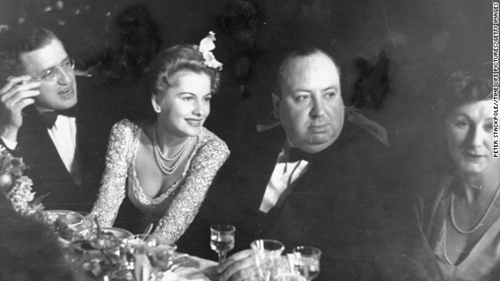
Joan Fontaine, sitting with David O. Selznick, Alfred Hitchcock and Alma Hitchcock at the 1941 ceremony, starred in “Rebecca,” though she lost the gold to Ginger Rogers. “Rebecca” won Best Picture and Best Cinematography. Fontaine claimed the Oscar the next year in Hitchcock’s “Suspicion.” In the 1941 show, President Franklin D. Roosevelt gave a six-minute, direct-line radio address from the White House, honoring the work of Hollywood. This was the first time an American president had participated in an Academy Awards evening. Also, for the first time, the names of all the winners were kept secret until they were announced during the ceremony. Hitchcock received an honorary Oscar in 1968.
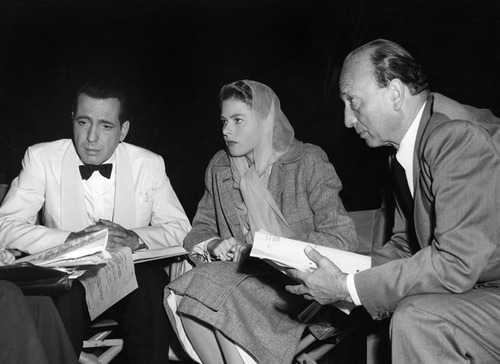
Humphrey Bogart, Ingrid Bergman and Michael Curtiz on the set of “Casablanca,” which snared the gold in 1944. The film was released in late 1942 and competed with titles from 1943.
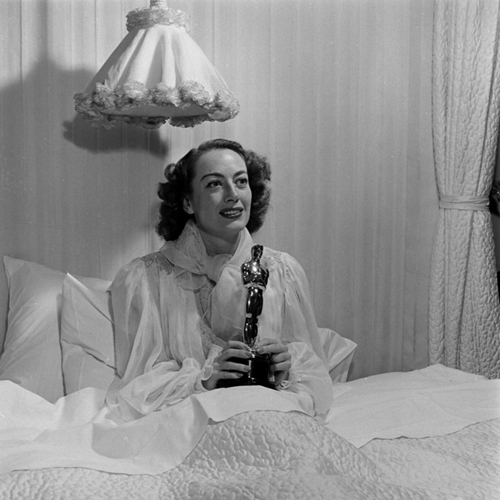
Joan Crawford triumphed playing the title role in 1945’s “Mildred Pierce.” Director Michael Kurtiz accepted the award at the ceremony because Crawford was ill and confined to bed. Clearly, she perked up when she found out she won.
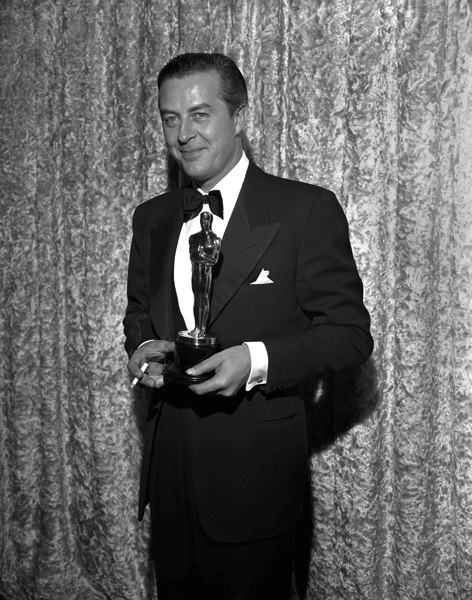
Ray Milland holds his Best Actor Oscar. He won for his portrayal of an alcoholic writer in Billy Wilder’s “The Lost Weekend” from 1945. The film also won Best Picture, Best Director and Best Screenplay, a rare feat for such a noirish flick.
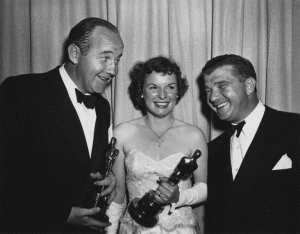
“All the King’s Men,” a political noir from 1949, garnered Best Picture, Best Actor for Broderick Crawford and Best Supporting Actress for Mercedes McCambridge. The gold winners savor the moment with director Robert Rossen.
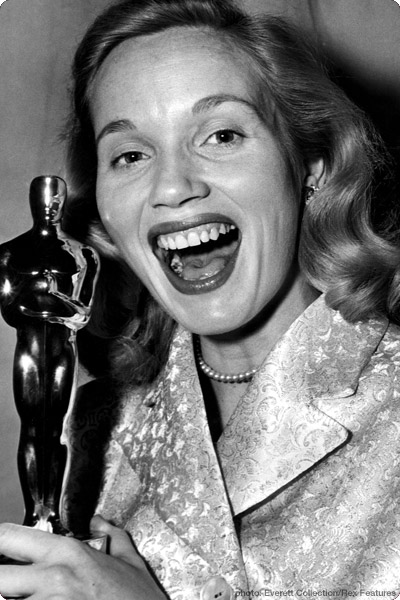
Eva Marie Saint took home the Best Supporting Actress Oscar for
“On the Waterfront” from 1954. “On The Waterfront” also won Best Picture, Best Actor (Marlon Brando), Black-and-White Art Direction-Set Decoration, (Richard Day), Black-and-White Cinematography (Boris Kaufman), Directing (Elia Kazan), Film Editing (Gene Milford), and Writing – Story and Screenplay (Budd Schulberg).
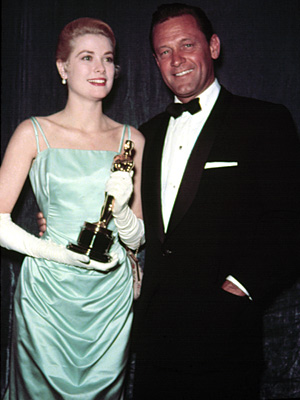
Grace Kelly won the Best Actress gold for 1954’s “Country Girl.” I know, I know, it’s not a noir but Kelly was one of Hitchcock’s favorite blondes, she’s shown with co-star William Holden (mmm) and I love the dress. Kelly quit acting in 1955 to marry Prince Rainier.
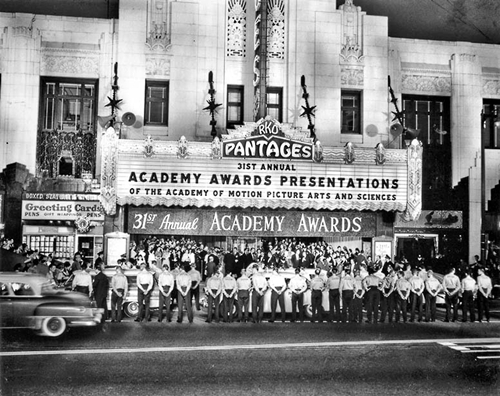
The RKO Pantages Theatre hosted many Oscar ceremonies. The 31st Academy Awards ceremony, held on April 6, 1959, ended 20 minutes early, after producer Jerry Wald cut numbers from the show to make sure it ran on time. Host Jerry Lewis was left to fill up the time.
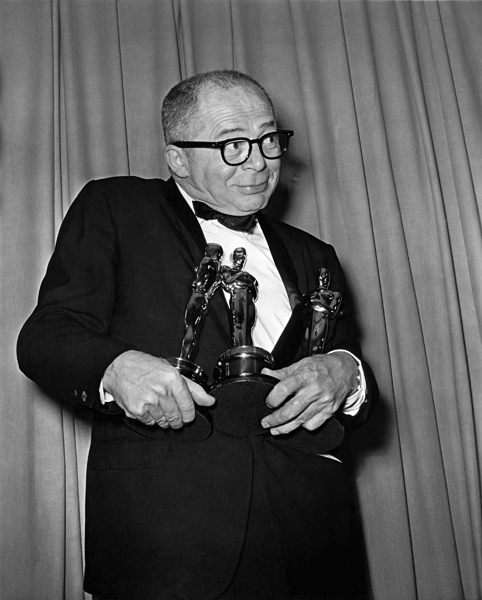
Billy Wilder juggles Oscars snared by his dark comedy “The Apartment,” which won Best Picture, Best Black-and-White Art Direction-Set Decoration (Alexander Trauner and Edward G. Boyle), Directing (Billy Wilder), Film Editing (Daniel Mandell), and Writing – Story and Screenplay written directly for the screen (Billy Wilder and I.A.L. Diamond).
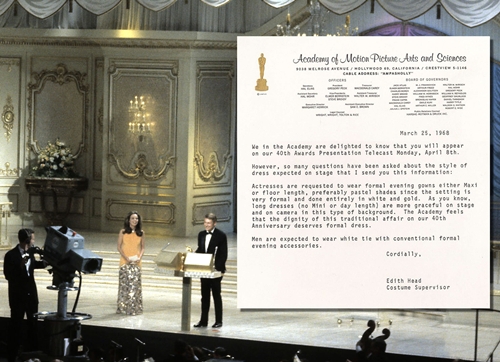
Eight-time Costume Design winner Edith Head was costume supervisor for the 40th (1967) Academy Awards and offered her fashion tips in the letter above. Also seen above are presenter Leslie Caron and Best Director winner Mike Nichols.
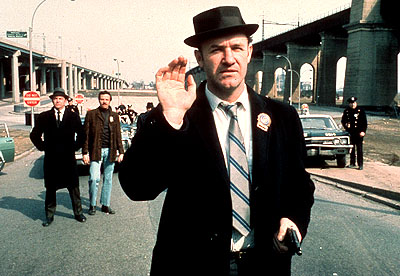
“The French Connection,” a neo-noir from 1971, won Best Picture. The film also won Academy Awards for Best Actor (Gene Hackman), Directing (William Friedkin), Film Editing (Jerry Greenberg), and Writing – Screenplay based on material from another medium (Ernest Tidyman).
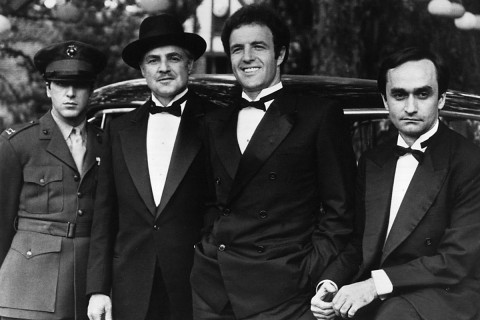
“The Godfather” (1972) cast members: Al Pacino, Marlon Brando, James Caan, and John Cazale. The classic family-crime saga won Best Picture. The movie also won Best Actor (Marlon Brando) and Writing – Screenplay based on material from another medium (Mario Puzo and Francis Ford Coppola). “The Godfather Part II” (1974) became the first sequel to win the award for Best Picture. Part Two also claimed five more Oscars including the directing prize for Coppola.
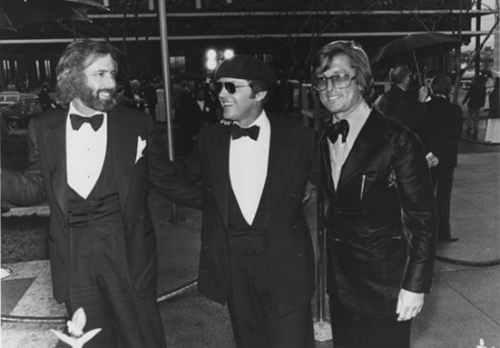
Robert Towne, Jack Nicholson and producer Robert Evans at the 1975 Oscars. Towne took home the Oscar for writing “Chinatown,” perhaps the best neo-noir script ever written.
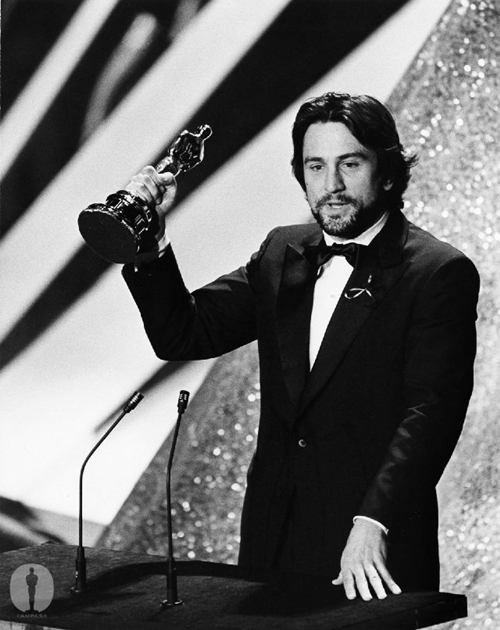
Robert DeNiro accepts his Best Actor Oscar for “Raging Bull” (1980) directed by Martin Scorsese, who grew up on classic noir and became a neo-noir master. The oft-snubbed Scorsese finally won the directing gold for 2006’s “The Departed.” This was DeNiro’s second Oscar, having garnered Best Supporting Actor for “The Godfather Part II.”
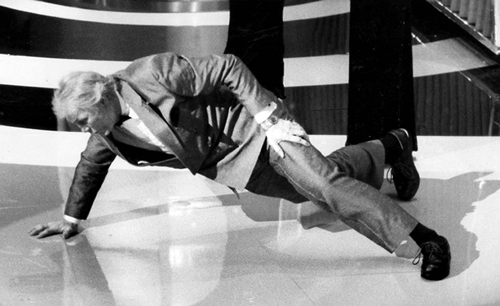
During his fourth decade in the movies, Jack Palance won Supporting Actor for his role as Curly in “City Slickers” (1991). His famous one-handed pushups onstage became a running joke with host Billy Crystal throughout the show. Our favorite Palance film-noir part: “Sudden Fear” (1952, David Miller) in which he co-starred with Joan Crawford and Gloria Grahame.
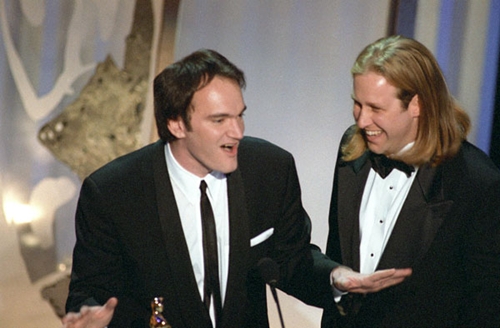
Quentin Tarantino and Roger Avary won the Oscar for writing “Pulp Fiction” (1994). It earned six other noms.
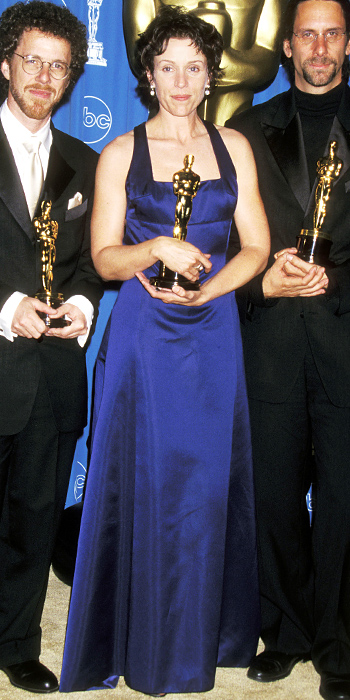
Frances McDormand hold her Best Actress Oscar for her work in 1996’s “Fargo.” Writer/director team Joel and Ethan Coen won for Best Original Screenplay. They went on to win writing and directing Oscars for the 2007 neo noir “No Country for Old Men.”










From FNB readers